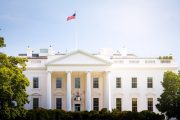
Michigan Governor Gretchen Whitmer (shown) is the target of at least two lawsuits, charging her with constitutional violations and executive order overreach. In response to the coronavirus threat, Whitmer issued executive order limitations on freedoms that were among the most restrictive of any gubernatorial executive orders.
The first lawsuit, filed on Wednesday by the Great Lakes Justice Center (GLJC) on behalf of a number of churches and their pastors, claims Whitmer violated the plaintiffs’ First Amendment’s rights to free exercise of religion, free expression, free association, quashing of due process rights, and the guarantee of a republican form of government for the state (as of now this lawsuit is on hold as Whitmer has said she will exempt churches and other religious institutions from restrictions).
The other, launched by the state’s legislative branch, expanded on Whitmer’s violations, including ignoring congressional limitations on her power and issuing executive orders without approval by that branch.
In a press release announcing the first lawsuit the GLJC said:
Just because a governor has ink in her pen does not mean the Constitution authorizes her to use it, notwithstanding good intentions. The Constitution does not become irrelevant during any emergency, including a pandemic.
Instead of every citizen being subject to the rule of law, they have become subjects of defendant’s daily edicts.
Nothing in the U.S. Constitution authorizes a state governor to suspend constitutional representative governance by declaring new emergencies every 28 days into perpetuity. Allowing one person to wield absolute power is not a republican form of government, it is tyranny.
The GLJC charged that Whitmer “unilaterally, without legal authority, and without the statutorily required extension approval from the Michigan Legislature, issued numerous Executive Orders [including] all individuals currently living within the State of Michigan are ordered to stay at home.… [And] public and private gatherings of any number of people occurring among person not part of a single household are prohibited.”
When she extended that executive order (EO), she clarified that those gatherings included churches: The EO “continues to prohibit gatherings of two or more individuals, including at churches.”
The lawsuit included claims of executive overreach that members of the Michigan House are likely to reiterate in its own lawsuit:
In response to the COVID-19 virus pandemic, Defendant declared a state of emergency on March 10, 2020 … and subsequently issued, through April 30, 2020, an additional sixty EOs.
Once a governor declares a state of emergency or disaster, [legislative authority] grants Defendant the exclusive authority to issue EOs for 28 days without legislative approval.
After 28 days, Defendant is required to obtain approval from the Legislature to extend the state of emergency and any EOs issued pursuant to the emergency.
Defendant requested an extension from the Legislature and on April 7, 2020, she was granted an extension of the state of emergency through April 30, 2020.
On April 24, 2020, Defendant issued several EOs without legislative approval that were set to expire on May 15, 2020, a date beyond the extension previously granted by the Legislature.
Defendant unilaterally asserted that these new EOs were effective through May 15, 2020, despite the lack of the statutorily required Legislative extension to that date.
On April 30, 2020, the Legislature refused to extend the state of emergency. Because no extension was granted by the Legislature, Defendant had a clear legal duty and was expressly required … to “issue an Executive Order or proclamation declaring the state of emergency terminated.”
Defendant issued [an EO] rescinding her prior declarations of a state of emergency and state of disaster.
However, without any statutory or constitutional authority, Defendant immediately thereafter decreed, and is now attempting to enforce, new EOs issued unilaterally on and after April 30, 2020.
Despite the Legislature’s refusal to extend the state of emergency, Defendant is now enforcing illegal and unauthorized EOs.
All citizens and churches in Michigan are subject to the requirements and penalties of Defendant’s unlawful EOs.
Not all of those citizens and churches are happy about her unilateral assumption of powers not granted to her. There have been protests across the state that included armed citizens entering the state house (she was not present) to express their displeasure at her overreach.
The legislature, prior to filing the lawsuit on Wednesday, had given the governor a peace offering, including an opportunity to work together on appropriate measures to keep the virus infection from spreading. Instead she unilaterally extended her EO to May 28. Further, she declared that if the legislature had the gall to pass legislation or resolutions restricting her power, she would ignore them:
With regard to any of the blatantly political conversations about taking executive power away from my office, I’m just going to reiterate for — I don’t know how many times — the umpteenth time: I’m not going to sign any bill that takes authority away from me or from any future governor.
The powers of the executive office are incredibly important, especially in times of crisis where lives are on the line.
The sooner the court rules in favor of the plaintiffs the better. It’s long past time for the governor to recognize the limitations of her office and that they definitely prohibit her from turning her position into that of a czar in charge of a fiefdom.
Image of Gretchen Whitmer: michigan.gov
An Ivy League graduate and former investment advisor, Bob is a regular contributor to The New American, primarily on economics and politics. He can be reached at [email protected].




